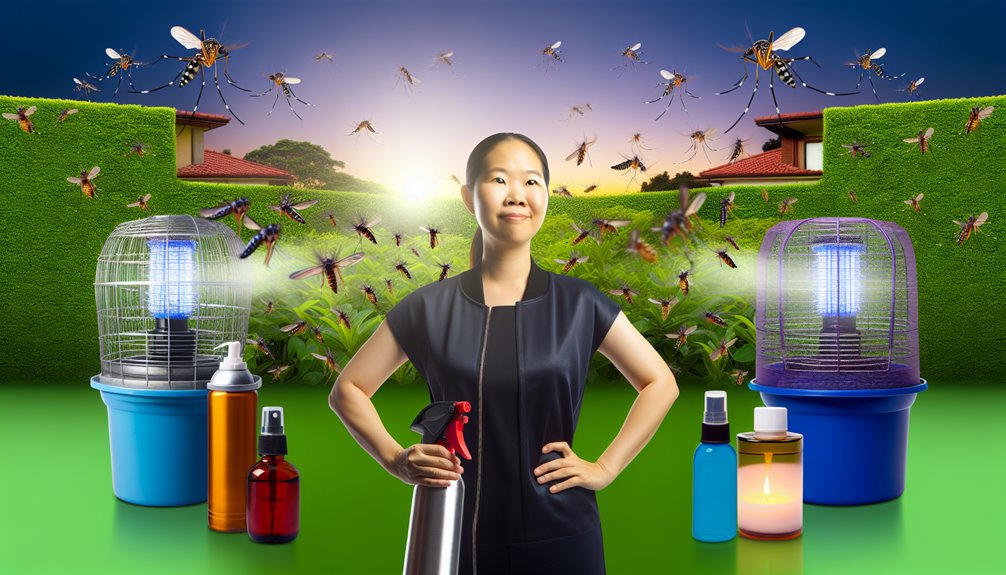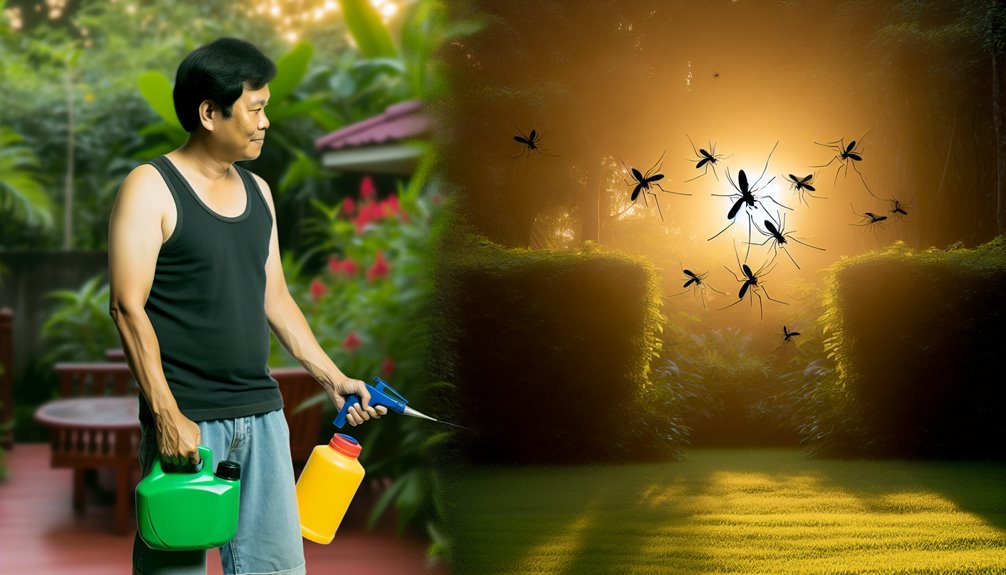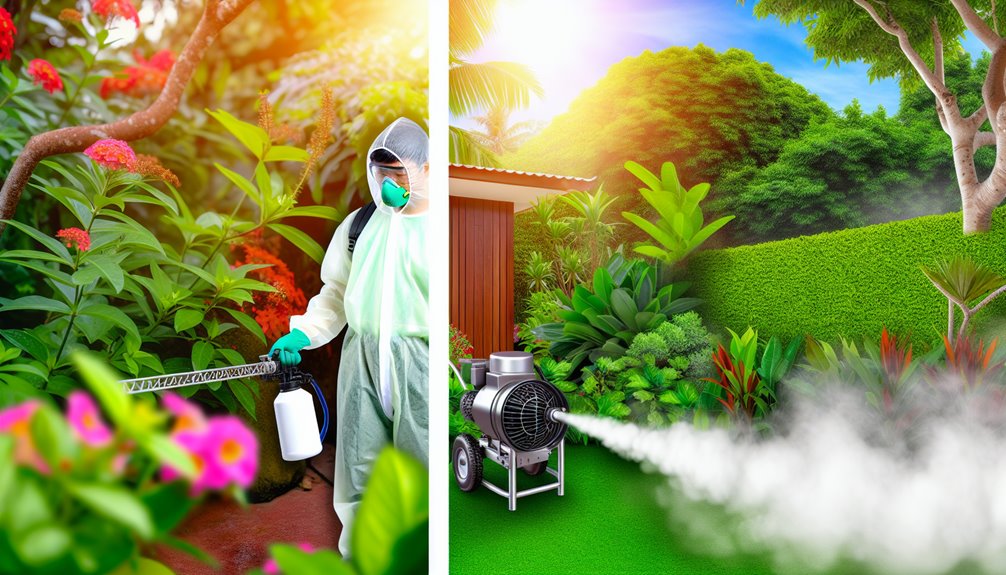When it comes to mosquito control, many homeowners hold onto certain misconceptions that can cloud their judgment. You might think that DIY methods can match the effectiveness of professional treatments or that environmental concerns outweigh the benefits. However, these beliefs can lead to ineffective strategies and persistent problems. Exploring the reality behind these myths will help you make informed choices about the best approach to tackle mosquito infestations.
Myth 1: DIY Methods Are Just as Effective as Professional Treatments

While many homeowners may believe that DIY mosquito control methods can match the effectiveness of professional treatments, this assumption often overlooks critical factors.
DIY effectiveness often varies based on the products used, application methods, and environmental conditions. In contrast, professional treatments utilize advanced techniques and EPA-approved solutions that are specifically designed to target mosquito populations more effectively.
Treatment comparisons reveal that professionals assess your property, identify breeding sites, and tailor their approach, resulting in long-lasting results. Additionally, they possess the training to apply treatments safely and efficiently, minimizing risks.
While DIY methods might offer short-term relief, they rarely provide a thorough solution, leaving you vulnerable to mosquito resurgence. Investing in professional treatments guarantees a more reliable and sustainable mosquito control strategy.
Myth 2: Professional Mosquito Control Is Harmful to the Environment
Many people worry that professional mosquito control might harm the environment, but this concern often stems from misconceptions about the methods and products used in these treatments.
In reality, reputable pest control companies prioritize treatment safety and minimize environmental impact. They utilize targeted applications that focus on mosquito habitats, reducing the risk to non-target species. Most products are carefully selected for their effectiveness while adhering to stringent regulatory standards. This means that when applied correctly, they pose minimal risk to beneficial insects and the surrounding ecosystem.
Additionally, professional mosquito control can actually enhance the environment by reducing the risk of mosquito-borne diseases, ultimately protecting both human health and local wildlife.
Understanding these facts can help alleviate concerns about environmental harm.
Myth 3: Once You Get Rid of Mosquitoes, They Won’t Come Back

Assuming you’ve successfully eliminated mosquitoes from your property, it’s vital to understand that they can return. Mosquitoes are resilient creatures, and factors like seasonal fluctuations can lead to their resurgence.
Even if you’ve addressed current populations, nearby areas may still harbor breeding grounds, allowing new mosquitoes to migrate back to your space. Additionally, female mosquitoes can lay eggs in stagnant water, which can hatch when conditions are favorable.
Regular monitoring and proactive measures are important to maintain control. Implementing ongoing mosquito management strategies helps reduce breeding sites and minimize the risk of re-infestation.
Myth 4: Mosquito Control Is Only Necessary During Summer
Although summer is often associated with increased mosquito activity, the need for mosquito control extends well beyond these warmer months.
Many people underestimate the importance of seasonal awareness regarding mosquito life cycles. Mosquitoes can breed in stagnant water during cooler months, leading to populations that spike in spring.
Implementing year-round strategies is essential for effective control. This includes regular inspections of potential breeding sites and ongoing treatments, even in off-peak seasons.
Neglecting mosquito control outside of summer can result in a sudden resurgence of these pests when temperatures rise again.
Myth 5: All Mosquito Control Treatments Are the Same

While it might seem convenient to think that all mosquito control treatments deliver the same results, the reality is far more complex.
Treatment effectiveness varies greatly based on the specific application methods employed. For instance, some treatments focus on larvicides, targeting mosquito larvae before they mature, while others use adulticides, which eliminate adult mosquitoes on contact.
Furthermore, the techniques of application—whether through fogging, spraying, or baiting—affect how effectively the treatment penetrates and covers the targeted area.
Additionally, environmental factors like temperature and humidity can influence the efficacy of these methods.
Understanding these differences is essential for selecting the most appropriate mosquito control strategy to guarantee a safe and comfortable environment for those you serve.
Myth 6: Professional Treatments Are Too Expensive
Many homeowners believe that professional mosquito treatments are prohibitively expensive, but this perception often overlooks the long-term benefits and cost-effectiveness of such services.
When you evaluate a cost comparison, the initial investment can lead to significant long-term savings. Here are three key points to reflect on:
- Reduced Health Risks: Professional treatments minimize the risk of mosquito-borne diseases, potentially saving you medical expenses.
- Increased Property Value: A mosquito-free yard enhances your home’s appeal, which can translate into a higher property value.
- Time and Effort Savings: Hiring professionals frees up your time, eliminating the need for DIY treatments that may not be effective.
Investing in professional mosquito control not only protects your home but also guarantees lasting benefits that outweigh the costs.
Myth 7: Mosquitoes Only Breed in Standing Water
It’s a common misconception that mosquitoes only breed in standing water, but this oversimplification misses several critical breeding sites.
While stagnant bodies of water like ponds and puddles are well-known breeding habitats, mosquitoes can also thrive in tiny amounts of water found in containers, clogged gutters, and even plant saucers.
These diverse environments support the mosquito life cycle, allowing eggs to hatch and larvae to develop.
Understanding the variety of breeding habitats is crucial for effective mosquito control. By identifying and eliminating these sources, you can considerably reduce mosquito populations in your area.
Conclusion
As the owner of Mosquito Eliminators of South MS, I truly believe that understanding the facts about professional mosquito control can make all the difference for your outdoor experience. I know firsthand how frustrating it can be to deal with pesky mosquitoes, and I want to help you create the backyard paradise you deserve. If you’re ready to take the next step in protecting your space, I invite you to visit us at mosquitoeliminatorsms.com or give us a call at (601) 336-2277. Let’s work together to keep those mosquitoes at bay and enjoy the great outdoors worry-free!

